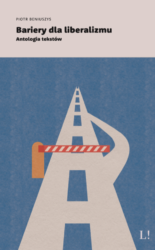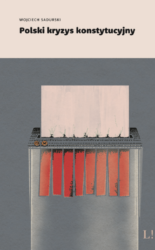The words of Wojciech Młynarski’s song “What can still be screwed up, gentlemen?” come to mind. We obviously add – not only gentlemen, but also ladies. Unfortunately, the matter is far more serious, because it is not about inadequacy and incompetence that is at stake (that too, of course), but the direct intention to destroy a free, democratic state, which has been consequently pursued for over six years.
The words of Wojciech Młynarski’s song ‘What can still be screwed up, gentlemen?’ come to mind while reflecting on the past year and the prospects for the current year in the context of the ‘achievements’ of the broadly defined ruling camp. We should obviously add not only gentlemen, but also ladies. Unfortunately, the matter is far more serious, because it is not inadequacy and incompetence that is at stake (that too, of course), but the direct intention to destroy a free, democratic state, which has been consistently pursued for over six years.
It all started with the destruction of the rule of law, pardons for people convicted in non-final judgments and an attack on the Constitutional Tribunal. The political subjugation of the prosecution service followed, as did the assumption of control of the National Council of the Judiciary, which has a key influence on all judicial nominations, party functionaries in the ordinary courts and the apparatus created from scratch to repress judges who are rebellious with respect to the authorities, as well as the annexation of the Supreme Court and the systemic questioning of the European legal order and our membership of it.
It is precisely because of the efficient and extremely impertinent dismantling of the rule of law that everything that the ruling party is doing is possible. Let us take a brief look at what they have been doing over the past 12 months.
They started with punitively sending away a dozen or so prosecutors who were trying to do their job properly and independently. Like the Tsar’s office, they were sent to distant posts for six months as punishment. These included Katarzyna Kwiatkowska, the head of Lex Super Omnia, and Ewa Wrzosek, who, as we now know, was under illegal surveillance with the use of Pegasus.
This was followed by another amendment to the Act on the Supreme Court, the eleventh in four years (this is also the current quality of legislation), amending, among other things, the principles of selecting presidents of the chambers of the Supreme Court. It granted additional powers to the President and the First President of the Supreme Court, in order to make it easier for the neo-NCJ nominees to finally take control of the activity of our most important court.
These new principles have been eagerly taken advantage of, including the assumption of complete control over the Civil Chamber. An excellent example of how the Supreme Court operates after the ‘good changes’ is Ms. Małgorzata Manowska’s (who is illegally holding the office of First President) conduct of seizing the files from a case that returned from Luxembourg (a case pending in the CJEU regarding Judge Waldemar Żurek’s appeal).
A bench of seven judges of the Civil Chamber was supposed to issue an extremely important judgment on this basis, in which it was expected to pre-judge whether almost fifty neo-judges of the Supreme Court (including M. Manowska herself) are legally appointed. It cannot do this precisely because the files have been ‘arrested’.
I consider this to be an unimaginable example of arrogance, a breach of the legal order and the abuse of her position, including a violation of the European Treaties by blocking the preliminary ruling procedure, which is a fundamental rule of judicial communication between courts in the European Union.
Another example of lawlessness in 2021 is the continued operation of the so-called Disciplinary Chamber, despite two rulings of the Court of Justice of the EU in July which are unambiguous in both their wording and their meaning. This quasi-judicial, illegal body is continuing to suspend judges and lift their immunity, completely disregarding the European judgments.
The judges unlawfully removed from office by this apparatus of repression (Igor Tuleya, Paweł Juszczyszyn, Piotr Gąciarek and others) are unable return to their work. The disciplinary commissioners appointed by Minister Ziobro are prosecuting judges for applying EU law. A normal person will find none of this comprehensible, but it is a reality of our times.
And finally, a prime example demonstrating the scale of the assault on the rule of law in Poland and the extent of the destructive activities of the authorities over the past year. Ms. Przyłębska’s tribunal received motions from the prime minister and the minister of justice to ‘examine the constitutionality’ of provisions of the Treaty on European Union and the European Convention on Human Rights. This was about the foundations of freedom and the legal security of the citizens, namely the right to an independent, impartial court (which, after all, the Constitution guarantees us in Article 45 to exactly the same extent).
Two autumn judgments of the dummy tribunal at Al. Szucha issued on the political order of the government show that this authority sees no barriers. What has always seemed to be obvious in a democratic world – the basic standard of protection of human rights – has been called into question before the whole world.
When speaking in the parliament in Strasbourg, the President of the European Commission, Ursula von der Leyen, emphasized that this was the first time in the history of the EU that the constitutional court of a Member State had challenged the most important provisions of the Treaty, while the media world-wide were talking about the Polish phenomenon. This was 2021 in terms of the devastation of the rule of law.
However, it should be remembered, and this is perhaps even more important, that during those same 12 months, an exceptionally great deal happened in the simultaneous battle over the protection of the rule of law. Not only in Poland, but throughout Europe, which has clearly noticed that what the ruling party is doing in our country could have highly negative implications for the whole of the legal area of the Old Continent.
To put it bluntly, if the European Union were to allow ostentatious breaches of the Treaty principles and fails to react decisively, such a situation could be repeated in other Member States. Politicians with autocratic ambitions would be able to copy and paste the solutions of the ‘good change’ into their national systems and contest the EU legal order, including in particular the judgments of the court in Luxembourg.
That is why both the European Commission, Parliament and the Court took a number of important steps last year to stop the destruction of the independence of the judiciary in Poland, and hence to protect the European legal area.
I mean the continuation and initiation of further so-called infringement proceedings (these are steps taken by the European Commission in situations of a breach of the Treaties, usually ending with a complaint filed with the CJEU), e.g. in the case of the Polish Constitutional Tribunal, the lack of acceptance of the Polish National Reconstruction Plan, requests to order penalties and resolutions of the European Parliament calling for urgent action by EU institutions. And the above judgments of the Luxembourg EU court, from which it clearly arises that the whole of the system installed in Poland after 2015 in the justice system dramatically breaches the EU criteria.
A citizen in our country simply has no guarantee of an independent court and hence a fair trial. The European Court of Human Rights very strongly joined the EU institutions last year. At times, the judgments from Strasbourg were even stronger than the judgments from Luxembourg. It conclusively arises from them that the neo-NCJ (which was expelled from the European Network of Councils for the Judiciary in 2021) is a completely politically subordinated, non-autonomous body, while its judicial nominations and promotions are unlawful.
In the Supreme Court, it is not only the Disciplinary Chamber that has to be liquidated, but so does the Chamber of Extraordinary Control and Public Affairs (which approves the results of elections), while all of the almost fifty neo-judges have to leave the Palace of Justice building at pl. Krasińskich.
What is also extremely important is that the judgments of the European courts have given the Polish courts very powerful legal instruments to oppose lawlessness. And the Polish courts are busily making use of them. Brave judges are issuing judgments directly on the basis of European law and standards, and are overturning judgments issued by neo-judges, undermining their status. The Supreme Court has also done this on several occasions (despite systemic enslavement, it still has independent judges who are not paralyzed by a fear of repression by the disciplinary division or the prosecution service).
If the system is to be fixed and the rule of law is to be restored in Poland, the judgments described above will need to be implemented. Porozumienie dla Praworządności [English – the Agreement for the Rule of Law] was established in 2021 for this purpose. This is a broad front of civic and legal organizations which have been consistently standing up in defense of the rule of law from the beginning and which have prepared a roadmap for the restitution of the constitutional system.
The Agreement was prepared in close cooperation with associations of judges and prosecutors, in particular with ‘Iustitia’, which simultaneously prepared a comprehensive statute implementing these solutions. This is primarily about liquidating the neo-NCJ, appointing a National Council of the Judiciary which is consistent with the Constitution, removing defectively appointed neo-judges from the system and holding new judicial recruitments as soon as possible to fill staff shortages in the courts.
The Agreement for the Rule of Law also envisages building an independent prosecution service practically from scratch, rebuilding an independent Constitutional Tribunal, and – what is particularly important – conducting a genuine reform of the judiciary that will make the Polish judiciary modern and efficient by 21st century Western European standards.
All democratic opposition parties joined the Agreement in December, including those which are not in parliament, acknowledging the program as being their own. Intensive work is currently being conducted in the working group on specific legislative projects.
Therefore, as can be seen, the scale of the destruction is one thing, while the increased action of European institutions and the activity of judges, citizens, and politicians in defense of the rule of law is another. This decidedly gives hope for the future.
And although Jarosław Kaczyński’s and Zbigniew Ziobro’s formation continues to announce plans of further ‘reforms’ to kill off the Polish judiciary, the determination of the European Union, the consistency of coordinated actions and the unequivocal lack of consent for the destruction of the system here in Poland create the assumption that not only will the authorities not manage to destroy everything, but importantly – it will later be possible to rebuild it efficiently and wisely, according to a prepared plan.
Photo by Giammarco on Unsplash
Michał Wawrykiewicz is an attorney at law. He has been managing a practice in Warsaw since 2003. He specializes among others in constitutional law, European law and human rights law. He has been involved in the defense of the rule of law in Poland since the beginning of the constitutional crisis in 2015. An expert of parliamentary working teams on Constitutional Governance and the Rule of Law, as well as on the Reform of the Judiciary, author of numerous opinions for the Parliamentary Analyses Bureau on legal acts regarding the judiciary. He was also an expert of the LIBE parliamentary committee (in the European Parliament) during the preparation of the report and during the hearing in the EP on the rule of law in Poland. He is a co-author of the book entitled “The Constitution. The rule of law. Judicial authority. Current problems of the third authority in Poland”, which describes breaches of the rule of law and the defense activities taken up by legal and civic circles. He jointly established the civic initiative #FreeCourts and was one of the initiators of the Justice Defense Committee (KOS) in 2018. Within KOS, he represents repressed judges of the ordinary courts and judges of the Supreme Court and the Supreme Administrative Court aged over 65 in proceedings intended to block their removal from active service under the Act on the Supreme Court of 2017. He appears on behalf of the judges of the Supreme Court and the Supreme Administrative Court before the Courts of Justice of the European Union in Luxemburg.





















